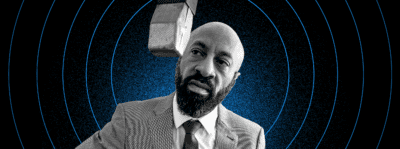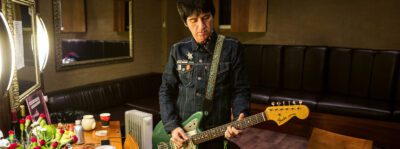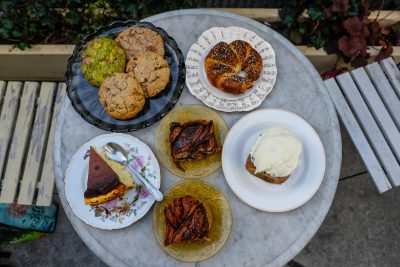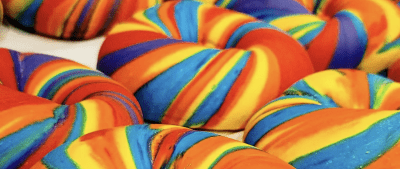Photo by Stephanie Keith
A night at Laylit: Arabic music, community celebration and grief
The massive club night is a celebration of Southwest Asian and North African culture in a difficult and fearful time
It’s easy to spot the Egyptians by the bar at Laylit. They dance in that quintessentially Egyptian way — slowly rotating, hips swinging indolently, raised hands swatting at the air above. Onstage, there’s iconic Lebanese drag queen Anya Kneez in a shimmering frock, creased and folded like freshly baked filo dough. Beneath the scintillating disco balls, keffiyehs are worn the old fashioned way — over the shoulders — or else ripped into a necktie, wrapped into a shirt, transformed into a bedazzled headdress, bucket hat-ified.
“We wanted to create a space for the community where we can dive into our roots and celebrate them together…a space where artists are free, where the music is free, and whatever needs to be expressed can be expressed,” says Nadim Maghzal, half of the Montreal-based Lebanese electronic duo, Wake Island. Maghzal founded Laylit, a Southwest Asian and North African-centered club night at Elsewhere, in 2018 with his bandmate, Philippe Manasseh, and Syrian DJ Saphe Shamoun.

A recent Laylit night at Elsewhere (Photo by Stephanie Keith)
Laylit, which means “the night of” in Arabic, was born amid a surge of Trump-era anti-SWANA animus. “When Trump got in power,” explains Maghzal, “there was this whole revival of xenophobia, especially against our community and we felt like, ‘no, we’re done. We’re done hiding who we are.’”
The first-ever Laylit party took place at the small LED-lit Bushwick bar Mood Ring. However, as demand for the event soared, founders began booking larger Brooklyn venues and eventually launched iterations of Laylit across North America.
“Laylit is popular because there are so few spaces like it,” contends one Syrian-American guest as she waited in line outside the Bushwick venue. “Arabs in diaspora need this inclusivity and this opportunity to gather.”
This is the 72nd Laylit party since the event’s founding. Its 1,400-1,500 guests headbang to Egyptian trap, gyrate to sonorous tabla beats, and sing along to an Arabized remix of “Sweet Dreams (Are Made of This)” by the Eurythmics — ululating over Annie Lenox’s dulcet tones.
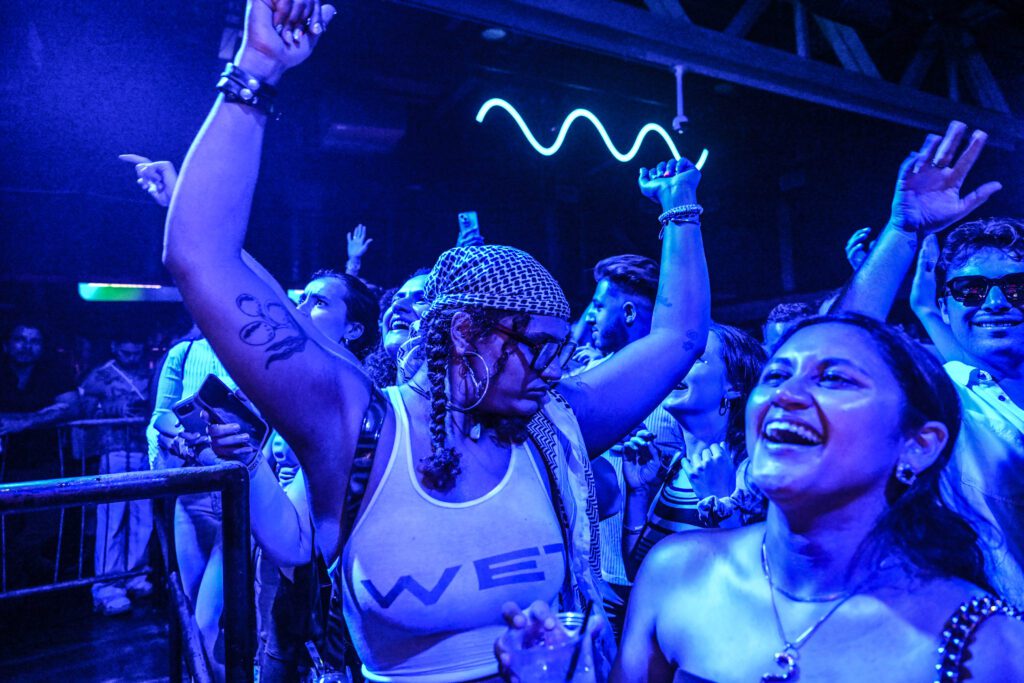

Dancing at Laylit (Photo by Stephanie Keith)
“For some people it reminds them of their family and friends. For some people it reminds them of nothing,” says Shamoun, referring to the culturally hybrid music that Laylit showcases. “For some it reminds them of a past that is also future. And for some, it reminds them of a past that was never there.”
While attendees may experience the music differently, Manasseh observes that the “nonverbal” nature of the dance floor cultivates an environment of acceptance. “No one has to explain themselves or what their issue is. It’s just this common understanding that we are each here with our baggage.”


Drag queen Anya Kneez performs at Laylit (Photo by Stephanie Keith)
For Manasseh and many guests, Laylit’s progressive environment helps them navigate their individual SWANA identities. “I came into this space feeling very awkward about being Arab — feeling very awkward about being gay and Arab. To be in a room where people were accepting, and, if not accepting, at the very least sharing similar struggles, it was kind of exposure therapy,” continued Manasseh.
‘Everything became meaningless’
But after Hamas carried out its October 7 attacks — which killed 1,200 — and Israel initiated its war on Gaza, which has now claimed an esitmated 37,000 lives, Laylit’s founders no longer knew what purpose they served. “Everything became meaningless for me after October 7,” says Shamoun. The event organizers halted their parties through the end of 2023 in solidarity with Gaza.
“Like so many in the [SWANA] community, we were just completely destroyed,” says Maghzal. “For the first five months after October 7, we were working harder than we ever had on not partying — writing statements and thinking about the issue. And each of us, outside of Laylit, were also, very much actively protesting.” The event signed onto a DJ’s Against Apartheid open letter and continues to diligently post about upcoming protests on their social media.
However, with the arrival of 2024, event founders decided, after much discussion, to bring back Laylit.


Finding spaces of joy (Photo by Stephanie Keith)
“We realized maybe canceling the events is not the most productive or fruitful at the moment,” says Shamoun, who mentioned that founders had sprawling conversations about how to speak up for Palestine without engaging in performative politics or using the cause as a selling point. Even with the event’s renewal, there is ongoing discourse about whether this was ultimately the right decision.
“It’s complex, because on one hand, we’re grieving, we’re dealing with this. But if we stop existing, spaces like ours just retract completely in this industry, which is extremely cutthroat,” says Maghzal, who also emphasized the importance of continuing to guarantee a livelihood for performers and venues that they collaborate with. Laylit’s spot on the cultural landscape is also, according to Manasseh, something that is “needed in a time like this.”
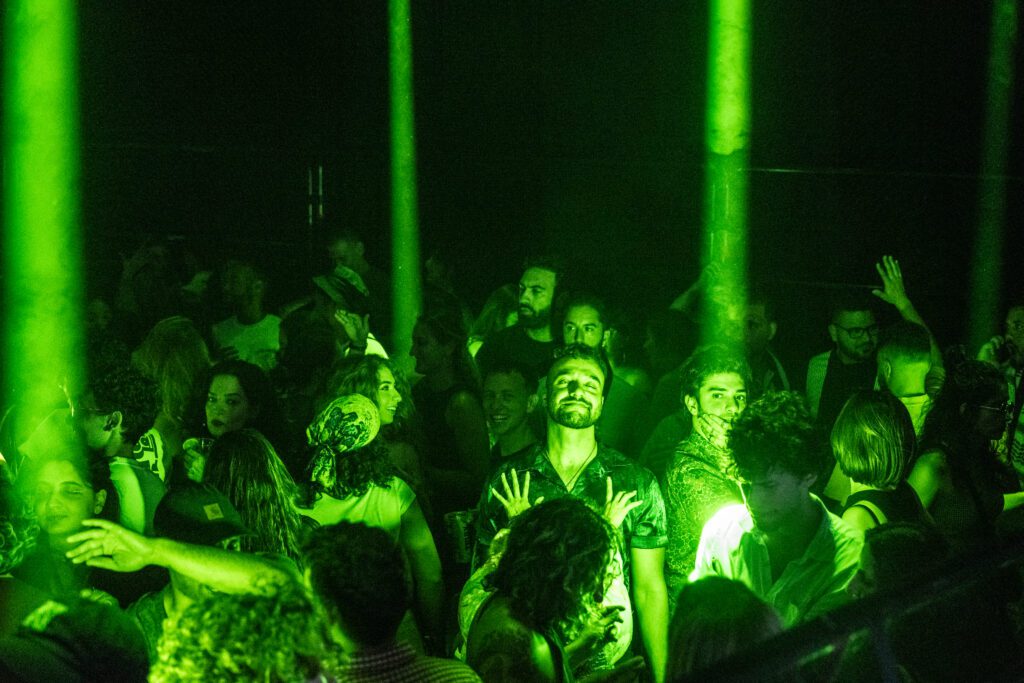

‘Needed in a time like this’ (Photo by Stephanie Keith)
A springboard for questions
One Palestinian attendee echoed the gratitude shared by many for the return of Laylit: “Everyone processes grief differently and I think a lot of us process through music. Singing all of the songs on our own is one thing, but getting to sing all the songs together, wave our flags, wear keffiyehs and feel safe doing so. It’s not something that’s granted to us everywhere else.”
For guest Hassan Sayed, one of the few in attendance who gave their names, Laylit is about finding “spaces of joy at a time where there’s a lot of grief.”
It’s not all necessarily about joy, though. The dancefloor can be a site, not just of bliss, but also, as Manasseh says,of “expunging demons,” flirting, protesting, mourning, unwinding.
“We don’t want to be pushing the conception that we’re just having fun and being joyful while there’s a genocide happening,” says Manasseh, who believes that the sense of “mutual grief” is latent in the party setting. “Footage of people dancing to ‘Dammi Falastini’ (My Blood is Palestinian) is not the same as the sweat and the dilemma of being in this room all together.”
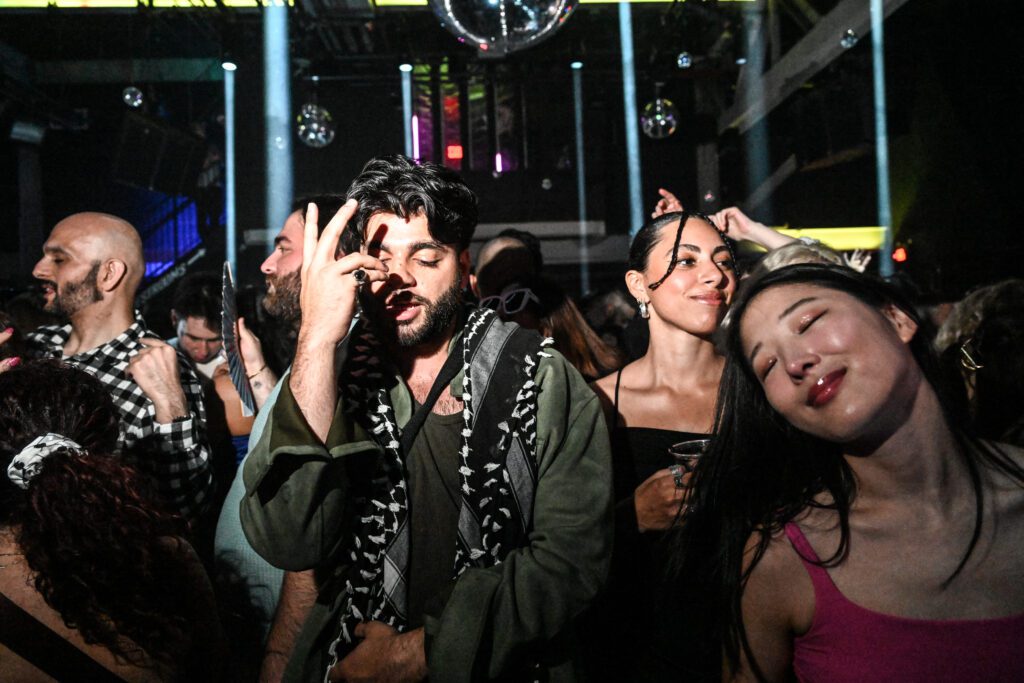

Keffiyehs and catharsis (Photo by Stephanie Keith)
Shamoun insists that Laylit is a “springboard for questions” that have no clear answers. This ambiguity allows for a range of social engagement — from the woman wearing Algerian kabyle jewelry expressing that she divorces music from the political to key organizers of Columbia’s Gaza Solidarity Encampments brandishing the Palestinian and pride flags as they forcefully stomped to dabke.
“We are literally responding to the world around us and to our community here and back home,” says Manasseh. “So it’s kind of like this living social experiment.”


Tradition and modernity (Photo by Stephanie Keith)
You might also like 

















